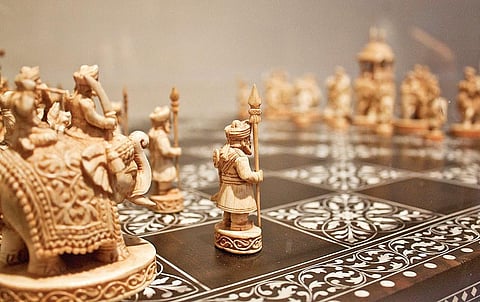

Contemporary bestselling fiction is dominated by desi thrillers.Ancient history, the favourite stomping ground for writers such as Amish, Ashwin Sanghi, Christopher Doyle, and many more, once again provides fodder, this time for Nihshanka Debroy's debut novel Checkmate, a historical mystery-suspense-thriller. As a tale revolving around chess, it’s one that the author, a former under-12 chess champion from Delhi, is more than qualified to tell.
As in most thrillers, the narrative runs along two interweaving tracks. The first, set in mid-fifth century central India, opens in medias res. A foreign army, the Svetahunas—White Huns—have attacked the Gupta Empire.
Enter our hero, Harshavardhan, a warrior whose side is fighting a defensive battle, the strategy being decided on an 'eight by eight red ashtapada cloth'. At this point, every bona fide thriller buff will do exactly the same thing: Google.
Ashtapada, the reader will learn, was an ancient game played on an unchequered board that was a precursor of chaturanga, from which came shatranj that, travelling westward, became chess. Back to the story: It is this cloth that Harshavardhan must safeguard. 'For generations rajas had planned their battles on this ashtapada. For generations those battles had been won. If he could save the ashtapada, this time too might be no different'. With so much invested in the ashtapada, Harshavardhan, perhaps foreseeing capture, hides it. A wise move that strings the plot along for another 27 chapters.
The second narrative thread, set in the present day, has a female protagonist, Vinita Joshi, head of a business corporation in New York City. Vinita’s busy life is disturbed by a phone call from India announcing the death of her father, Rajinder. The death hints at mysterious circumstances, and though she has been long estranged from her father, she must return to Delhi.
And in Delhi, she must find out the how and why of the tragedy, and also decide the fate of her father’s business empire. Going through his effects, she discovers a verse in Sanskrit that she decodes. And thus begins the quest that eventually circles back to the ashtapada cloth and throws up the question, 'Was chess itself more than a game?'
Though interesting, the basic premise isn’t enough to prop up the plot. The popular perception that thrillers are all about creating pace and tension isn’t quite true. Like any good story they need credible characters as much as increasingly dire situations that bring out the strength in these heroes and heroines.While Harshavardhan with his fighting spirit barely makes the bar, Vinita Joshi, brash, blunt and not particularly intelligent, falls short.
The rest remain cardboard cut-outs. The Svetahunas, with nicknames such as the White Shroud and Knotted Hair, are described as 'Savages from foreign lands with long hair and fair skin'. Even the poet Kalidasa, imprisoned with Harshavardhan, is reduced to platitudes. 'Beautiful words can come in the darkest of places, my friend.'
In a thriller, surprise is the secret ingredient. In this story, the element of surprise sputters like a poor firecracker. Vinita traipses across the countryside to Agra, Bhopal and Sanchi propelled by the staccato writing. ‘Vinita spat dust. Once. Twice. Her eyes forced open. The sunlight blinded her. Her neck burned. She turned sideways.’As Cicero said: Times are bad. Children no longer obey their parents, and everyone is writing a book.